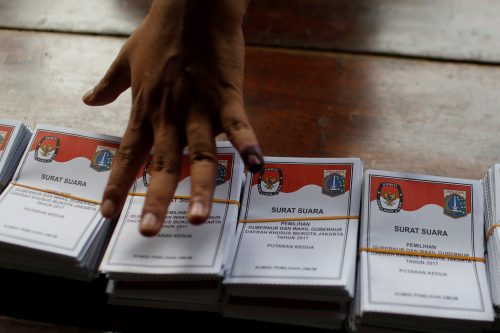The year 2018 will be an eventful year for Indonesian politics. In June 2018, 171 regional areas will simultaneously take to the polls to elect new mayors, regents and governors. These provincial elections will be followed by the general elections in 2019.
The provincial elections are considered an early battleground ahead of the presidential contest in 2019. All-out battles between big and small parties are likely as they try to either retain control or challenge the status quo.
But the 2018 regional elections are not just about national politics. Some of these elections will determine the development of remote regional areas such as Maluku, North Maluku and Papua, where the population is still deprived of modern luxuries found in the Western provinces.
Some regional votes will also see political contests far removed from the national scene. In the West Java gubernatorial election, for example, political celebrities will come against former elites from the security forces. In Central Java, the Indonesian Democratic Party of Struggle has turned heads by nominating the incumbent governor, Ganjar Pranowo, whose name has been mentioned in a major e-ID corruption scandal. The Golkar party has also attracted attention by backing Nurdin Halid, a prominent member of the political elite, to run as governor of South Sulawesi, despite the baggage of a corruption conviction.
Beyond this, the 2019 general elections are dominating political discussion in Indonesia. While President Joko Widodo (Jokowi) needs to maintain political, economic and social stability during the 2018 elections, he must also act fast and firmly if he is to secure his re-election.
Current polls conducted by SMRC, Indikator and Indo Barometer show Jokowi is a clear favourite in the race. Jokowi’s electability score is hovering between 45–65 per cent and a recent survey by SMRC also found that 74 per cent of respondents were either ‘satisfied’ or ‘very satisfied’ with his presidential performance so far.
But Jokowi’s next term is far from guaranteed. To firm up his chances of reelection he must focus on consolidating power within his inner circle and delivering on his previous campaign promises of economic development.
Others have their eyes set on the job too. Jokowi’s rival Prabowo Subianto has not ruled out the possibility of running again and is consistently placed second to Jokowi in polls. A CSIS Indonesia survey also found Prabowo to be more popular than Jokowi among millennial netizens.
Running for president is not Prabowo’s only option. He could go down former president Megawati’s path by nominating a proxy to run as his party’s candidate. Otherwise, he would need a popular companion on his ticket to amplify his chances of election. Both of these roles would suit Anies Baswedan, the new Governor of Jakarta.
Jokowi, on the other hand, has a plethora of potential running mates to choose from. These include Agus Harimurti Yudhoyono (son of former president Susilo Bambang Yudhoyono), the controversial yet popular Indonesian Armed Forces (TNI) former chief General Gatot Nurmantyo, the Minister of Finance, Sri Mulyani Indrawati, and even jailed former Jakarta governor Basuki Tjahaja Purnama (Ahok).
Beyond the campaigning and polls, identity politics stands out as one of the most influential factors shaping the 2018 and 2019 election outcomes. Ethno-religious rhetoric has become a staple in opposition campaigns against Jokowi and his camp in the past five years and this card will likely be played by anti-Jokowi forces should he decide to run for a second term.
Identity politics was especially salient in the 2017 Jakarta gubernatorial election. The incumbent Ahok, a Christian of Chinese heritage, lost the election and his fall from grace — despite his status as a pro-development and anti-corruption candidate — shows what a powerful political weapon identity politics has become, especially if used against minorities.
As the 2018 regional elections loom, there may be more clashes of ideas between champions of identity politics (such as the hard-line Islamic Defenders Front) and the voice of moderation, led by Nahdlatul Ulama and Muhammadiyyah.
The intense domestic focus on Indonesia’s upcoming elections may have important implications for Indonesia’s regional and international engagement. Campaigning demands may result in political elites channelling their attention and resources inwards, resulting in Indonesia’s decreased presence internationally. In particular, an Indonesian drawback could become a serious snag to regional efforts to push the ‘ASEAN at 50’ agenda.
That being said, Indonesia’s neighbours will need to remain vigilant to possible spillovers from Indonesia’s domestic political narrative. Ethno-religious rhetoric, for example, could be picked-up by opportunistic individuals in Malaysia as a political strategy. Traditional political punching bags such as Malaysia and Australia should brace for potential inflammatory rhetoric directed at them by Indonesian candidates hoping to secure votes.
Indonesia’s political atmosphere is set to remain highly combustible until the presidential election is settled in 2019. Those inside and outside Indonesia will need to exercise restraint so as to not turn a small spark into a giant blaze.
This article first appeared in East Asia Forum on March 20, 2018.





